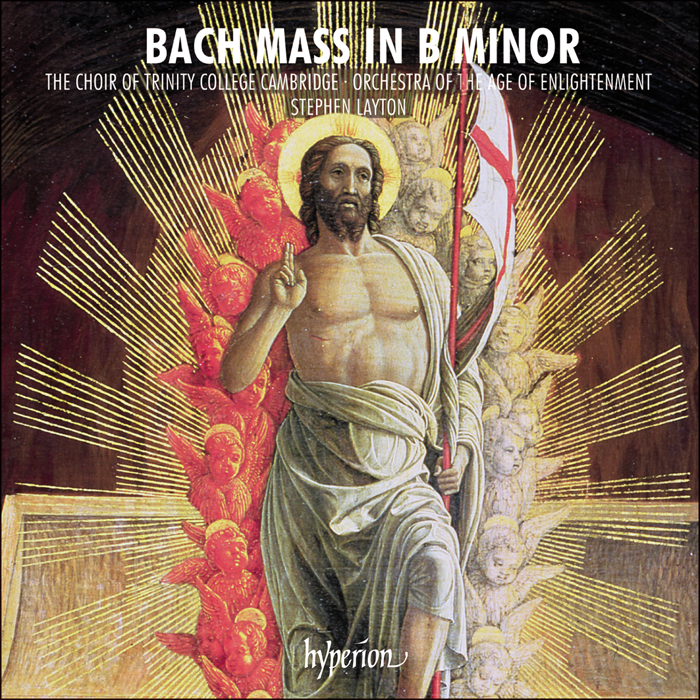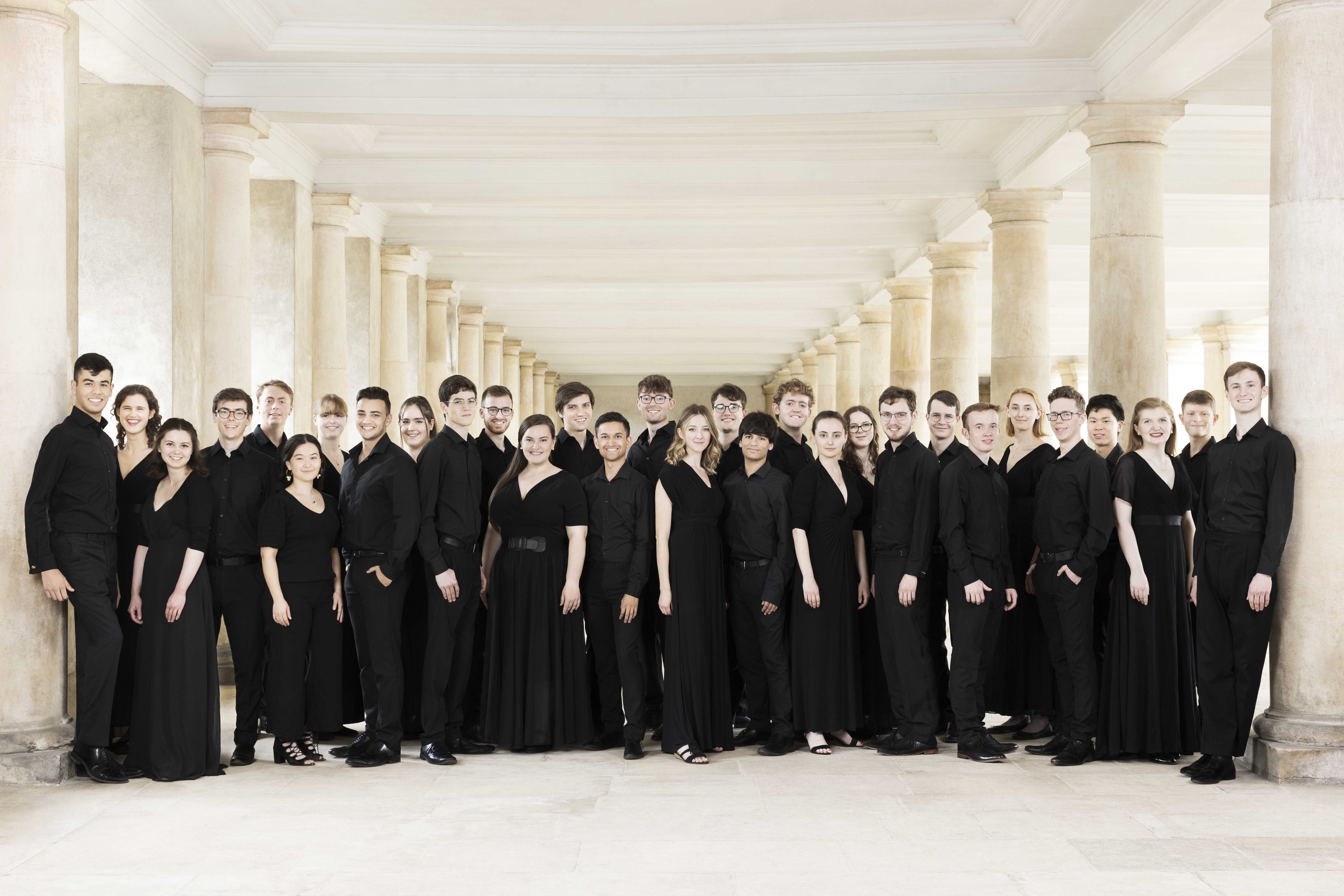Bach - Mass in B Minor
> See recording details...All’s well, everything precisely where it should be with this new Bach B minor Mass, albeit from a source not known for many forays into this territory. The Choir of Trinity College, Cambridge is one of the world’s finest choirs, one that operates in an atmosphere and expectation of excellence, neither knowing nor inhabiting a world of the middling or mediocre either in performances or recordings. And yet, and yet, Bach, especially the most substantial of Bach’s works–the oratorios, or this, his most major B minor masterpiece–haven’t been so much as scratches in the margin of the famed choir’s repertoire list. But when you hear this, you wonder “why not?” For all his eccentricities as a conductor (you know if you’ve been to a performance), Stephen Layton gets it right, meaning he successfully translates the symbolic shapes and forms of Bach’s uniquely fashioned musical architecture into a vibrant, vital concert-performance organism that’s fit and toned and primed for the long haul.
A good reason for this fitness and vitality is the fact that the choir consists of young adult university students, choral musicians who spend a significant number of hours every week devoted to singing, and performing. While there’s no shortage of commentary about the B minor Mass speculating about the possible reasons for its compilation/composition, remarking on its unsuitability for liturgical use, and noting its various original sources, no one mentions the single most important practical consideration–not how should it be performed or where, but who, exactly should ever perform it? That is, if one considers this work was ever intended to be performed whole. After all, since it obviously has no place in a church service, and at least in Bach’s time, there would not have been any other occasion or place to perform a Mass, what choir and in what context would that choir have presented a work of such monumental proportion and difficulty?
Perhaps somehow Bach anticipated a future in which such works could be easily and effectively displayed on recordings, or, okay, if not that, at least the existence of concert venues where major choral works of all types could be programmed for an eager public. No. More likely, Bach never thought of a concert performance for his Mass (other than perhaps the Kyrie and Gloria for his Dresden “audition”); rather his masterpiece was created for its own sake, for its own value as a kind of culmination of its composer’s life’s work–a concept difficult for people today to accept, therefore we must perform it, as if it had been intended as a big concert piece for the Symphony and Philharmonic Halls and State Theatres of the world–oh, not to mention hundreds of town halls and local churches and other community choir venues.
The fact is, this B minor Mass demands an awful lot of any choir, to sustain energy, focus, breath support–all of which impact pitch, blend, balance–that is, everything you depend on to make a respectable performance. A choir such at this one from Cambridge’s Trinity College is trained to tackle a two-hour-long, vocally demanding work; not many of the vast number of amateur groups attempting it have the stamina–and again, the point is, no one says you have to. Which brings me to the main point of this digression:
Last summer (2017) I heard this choir at the Elora Festival in Ontario performing a Bach concert jointly with the local Canadian ensemble The Elora Singers. The program was two Magnificats–one by J.S., the other by his son C.P.E. Not on the official program were two or perhaps three movements from the B minor Mass–not the whole thing, just enough to show not only that these movements can very happily be performed individually, but that they can bring down the house for their sheer drama and excitement, incorporating the full resources of Bach’s array of orchestral instruments and the power of all those talented, focused, vital, energetic singers. What a treat.
The Trinity choir, which, it turns out, had just made this recording a few months earlier, sang from memory, and the sheer joy on their faces, the integration of music with the freely expressive movement of the singers’ bodies as they sang made clear just how deeply Bach’s music had affected each and every one of them–and it was clear that they had spent some serious “quality” time living with this work. So, I’m saying that if I’m going to hear a work of this spiritual depth and musical complexity–not to mention demanding of exceptional vocal chops and physical stamina–I want to hear it as we do here. There’s an inevitable spontaneity and freshness to performances/recordings by choirs like this–choirs whose personnel changes constantly, but whose membership–young and fearless–is always up to a very high standard, and in this case, whose leadership is fully attuned to the repertoire at hand but also to the singers’ capacity to reach technical and musical heights.
We’re treated to lively tempos, exemplified in the Cum Sancto Spiritu (sound clip), which was one of the choruses performed in Elora, unusually transparent textures (you hear every voice, every instrumental line in the opening Kyrie, for example), first-rate soloists, and one of the more articulate and singer-sensitive orchestras you’ll hear in this music, always aware of atmosphere, contextual aspects of color and balance, and, although we don’t have the (originally scored) oboes d’amore or corno da caccia, making us appreciate the important variations in Bach’s orchestration. (If you want those period-instrument sounds along with a first-rate choir and soloists, go for the late-’80s Franz Brüggen/Orchestra of the 18th Century live concert recording on Philips–it’s excellent, although the sound doesn’t have quite the presence and clarity of this one.)
There are a zillion B minor Mass recordings available, many of them perfectly fine, most not bothering with things such as telling you which performing edition they are using (this one uses the 2010 revised version of the Bärenreiter Neue Bach Ausgabe). Speaking of which, some listeners/collectors may be wondering about an earlier (2014) B minor Mass release on this same label by Arcangelo–and if you own that disc you may think you’re seeing double: except for the cover art, the liner notes are exactly the same (only the dates have been changed). The performance is another very solid effort, well recorded, with only a couple of moments of imbalance in the opening Kyrie to draw it back from a top recommendation. (No mention of the edition used.) Most likely to garner critical attention is the recent Carus recording, which employs its own new edition of the Mass, using what’s known as “the Dresden parts” as the main text for the first part of the Mass.
As one who’s revisited more than a dozen recorded versions of the B minor Mass while preparing this review, my conclusion is that this one offers stylistically sound, true-to-Bach performances that are both modern yet historically informed, whose interpretive point of view and technical details will stand the test of time–and whose choral vocalism is a marvel, a thing of beauty to savor in service to Bach’s enduring masterpiece.
Artistic Quality: 10
Sound Quality: 10
David Vernier

Hyperion Records CDA68181/2
